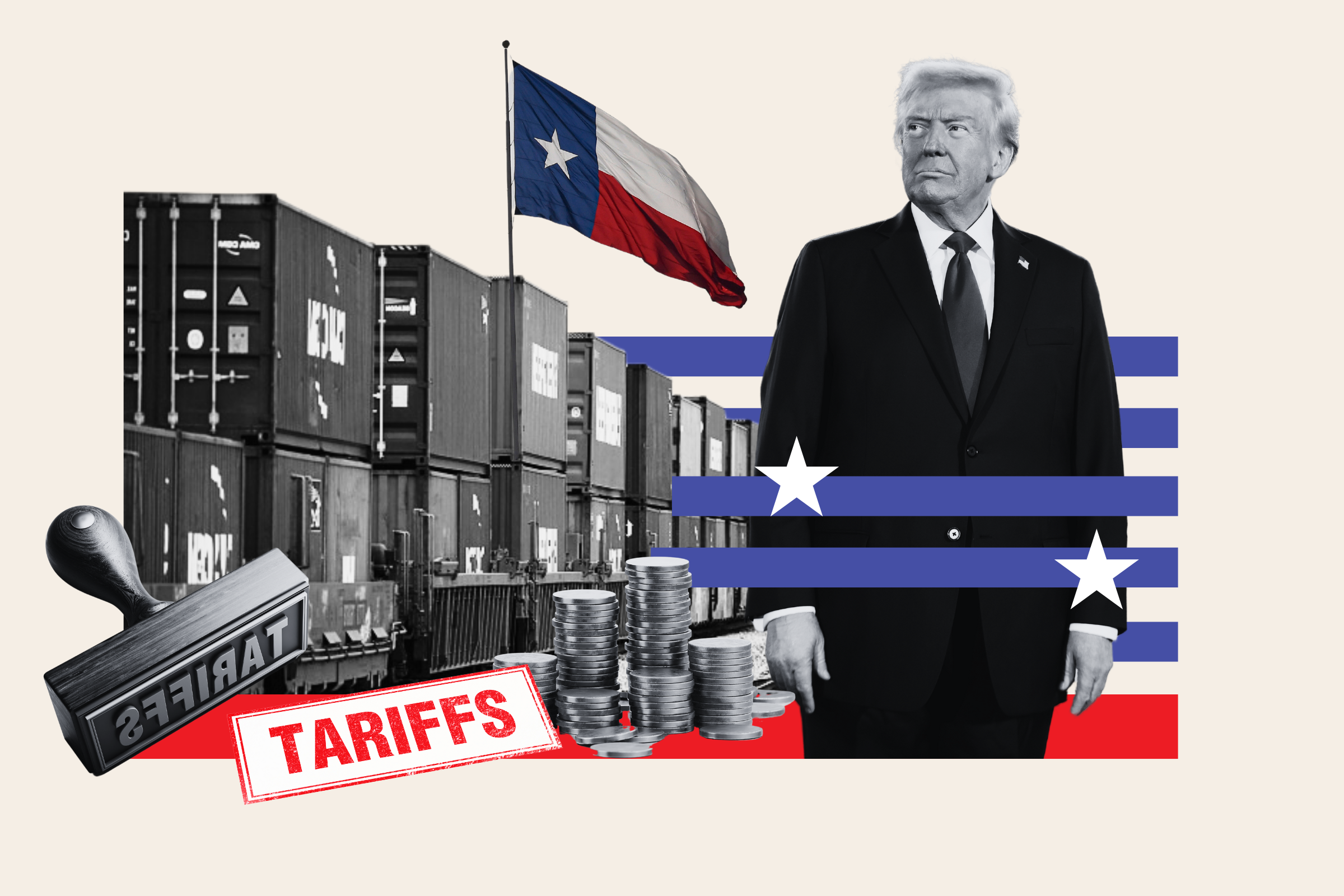Economists have warned Donald Trump’s plan to impose a 25 percent tariff on all products entering the United States from Mexico and Canada could have a dramatic impact on the economy of Texas, with one predicting it would cost 370,000 jobs in the Lone Star State.
The president-elect made the announcement on his Truth Social website on Monday, claiming the tariffs would remain in place “until such time as Drugs, in particular Fentanyl, and all Illegal Aliens stop this Invasion of our Country!”
Trump’s pledge to crackdown on illegal immigration into the U.S. was one of the key pillars of his successful 2024 presidential election campaign. Data from the Bureau of Labor Statistic’s current population survey estimated that in July 2023, there were 11.7 irregular migrants living in the country, up 800,000 on the figure for July 2022.
Speaking to Newsweek, Ray Perryman, CEO of financial analysis firm The Perryman Group, said the move would have a “disproportionate impact” on Texas. Referring to a Perryman Group study which he said will be published next week, the founder asserted: “If 25 percent tariffs on all goods from Mexico and Canada were to be implemented and maintained, we estimate that the annual losses to the U.S. economy would be about $250.6 billion in annual gross domestic product (2024 dollars) and about 1.97 million jobs. These losses amount to almost 1 percent of U.S. GDP.
“Because of its proximity to and integration of supply chains with Mexico, Texas would see a disproportionate impact, which we estimate to be about $46.9 billion in yearly gross state product (about 1.7 percent of the total) and approximately 370,000 jobs.”
Perryman added that if Trump’s tariffs sparked retaliatory tariffs from Mexico or Canada, or if they sparked inflation which led to an interest rates rise, the “adverse effects would increase.”
Gary Clyde Hufbauer, a prolific author and nonresident senior fellow at the Peterson Institute for International Economics, an independent think tank, agreed the proposed tariffs would hit Texas hard.
Addressing Newsweek, he said: “A tariff war with Mexico will severely impact Texas. Not only all those avocados, mangos, beer, tequila etc. becoming more expensive to Texas consumers, but the decline in cross-border truck and rail traffic will throw a lot of Texans out of work. Then there is the loss of Texas sales of consumer goods, cattle, gas, petroleum and electricity to Mexico. Thrown in a decline in Mexican tourism in Texas.”
In an interview with Newsweek, Vance Ginn, an economist and founder of Ginn Economic Consulting, urged Trump to back down from his tariff threats.
He said: “Raising taxes through tariffs is a costly mistake that hurts Americans and undermines economic growth. A 25 percent tariff on goods from Mexico and Canada would disproportionately harm Texas, the nation’s top trading state with these countries, by raising costs for businesses and consumers, disrupting supply chains, and reducing economic efficiency.
“In 2023, Texas exported and imported billions of dollars in goods and services to Mexico and Canada, vital trade that supports many Texas jobs. Protectionism through government-imposed tariffs distorts markets, reduces competition, and forces Americans to pay higher prices.”
One economist warned Newsweek that “a tariff war with Mexico will severely impact Texas.”
Photo-illustration by Newsweek/Getty
Maxwell Marlow, director of research at the Adam Smith Institute, a British economic focused think tank which advocates for free markets, told Newsweek Trump’s plan would likely see Texas hit by retaliatory tariffs.
He said: “Be under no illusion. Should Donald Trump enact his tariffs, they will be paid for by American consumers through higher prices on everyday goods. Americans went to the polls with the intention of defeating inflation, not to facilitate its return through bad trade policy.
“Retaliatory tariffs from America’s trading partners risk further escalating the situation, weakening America’s exports and productivity. This would be particularly devastating for areas such as Texas, where goods cross borders multiple times during their production. The government should avoid meddling with intricate supply chains—raising grocery bills in the name of outdated 18th-century mercantilist myths is not in the best interest of workers.”
Professor Dennis Jansen, who heads the economics department at Texas A&M University, told Newsweek that Mexico is “Texas’s number one trading partner,” accounting for 29 percent of the state’s exports.
He said tariffs would “raise prices to consumers,” adding that whilst this would happen across the U.S., “since Texas is a large exporting state, it may well have a stronger impact in Texas.”
Jansen added: “If there is retaliation from abroad—say if Mexico follows through on the threat to raise tariffs on goods exported from the U.S. to Mexico—this will further reduce the demand for Texas (and overall U.S.) exports.”
However, Trump’s tariff proposals were defended on X by billionaire hedge fund manager and Trump supporter Bill Ackman, who described them “as a weapon to achieve economic and political outcomes which are in the best interest of America, fulfilling his America first policy.”
“To be clear,” Ackman said. “According to Trump, the 25 percent tariffs will not be implemented, or if implemented will be removed, once Mexico and Canada stop the flow of illegal immigrants and fentanyl into the U.S.”
On Wednesday, Trump spoke with Mexican President Claudia Sheinbaum, who he said had “agreed to stop migration through Mexico” following the tariff threat.
However, Sheinbaum gave a different account of the conversation, commenting: “We reiterate that Mexico’s position is not to close borders but to build bridges between governments and between peoples.”
When contacted for comment by Newsweek on November 28, Trump transition spokesperson Steven Cheung simply replied: “Happy Thanksgiving!”


